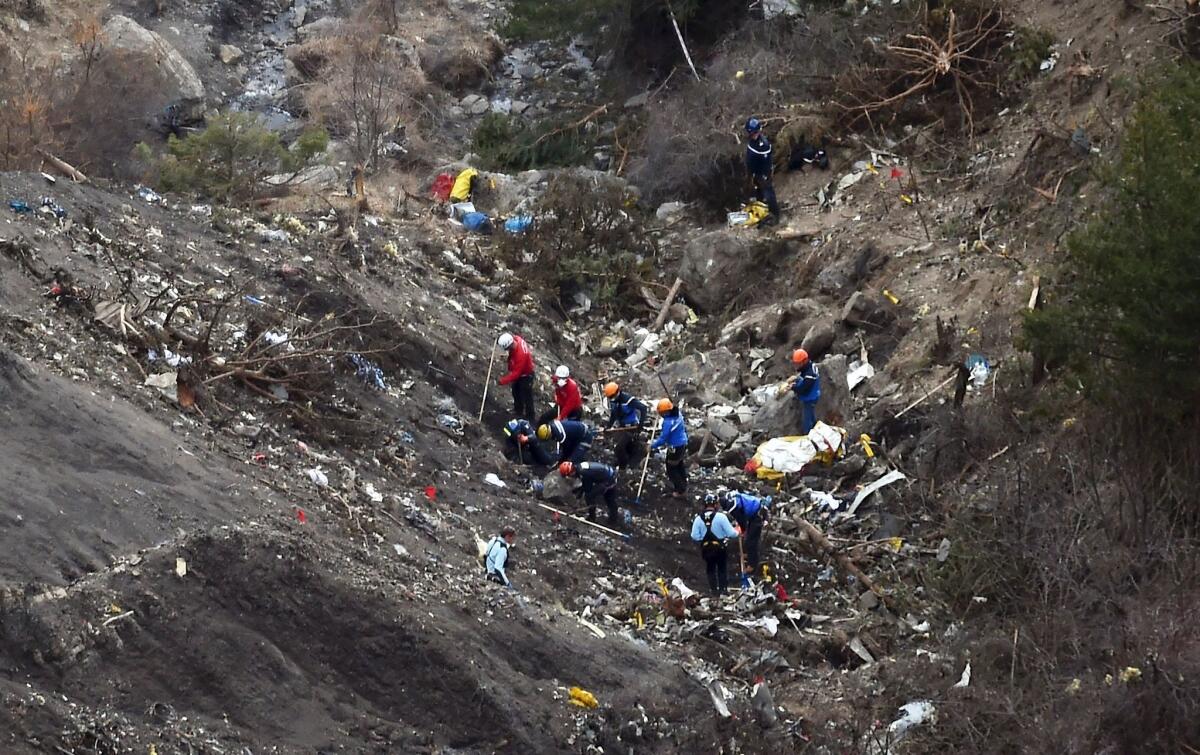Multiple doctors gave Germanwings co-pilot sick leave certificates before crash

This March 26, 2015, photo shows French gendarmes and investigators working at the crash site of the Germanwings Airbus A320.
- Share via
Reporting from Paris — Germanwings co-pilot Andreas Lubitz saw several doctors in the month before he deliberately flew a passenger jet into a mountain, killing all 150 people on board, French air accident investigators revealed Sunday. Some of those doctors issued him sick leave certificates, and one referred him to a psychiatric hospital – but no one informed the airline due to patient privacy regulations, and Lubitz continued to fly.
Lubitz may have been suffering from a “psychotic depressive episode” at the time of the crash, and had been prescribed antidepressants and sleeping pills in the months before, the Bureau d’Enquêtes et d’Analyses (BEA) said in its 87-page final report on the tragedy.
German airlines rely on pilots to self-report any medical conditions that would prevent them from flying. Because Lubitz never told Germanwings that he was suffering from mental illness, “no action could have been taken by the authorities or his employer to prevent him from flying,” the BEA concluded. Germanwings, a subsidiary of Lufthansa, has repeatedly denied any wrongdoing, insisting that Lubitz was certified fit to fly.
French investigators expressed frustration that doctors treating Lubitz refused to speak to the team conducting the inquiry, citing medical confidentiality.
The report recommended that airlines introduce more frequent medical evaluations for all pilots showing any kind of psychological or psychiatric problems, however minor, and urged changes to medical confidentiality rules that would allow them to be overriden in the interest of public safety. Investigators also called for greater support for pilots suffering depression, so they would be encouraged to admit they were ill and receive treatment rather than hide their condition for fear of losing their jobs.
The BEA’s findings drew angry reaction from the victims’ families, who were briefed in advance of the report’s release.
“People were not happy at all with some of the explanations,” Robert Tansill Oliver, whose son Robert Oliver Calvo was one of three Americans who died in the crash, told The Associated Press. “Some of the family members felt as if these BEA representatives were Lubitz’s lawyers — making excuses as to why Germanwings didn’t take action knowing what they knew.”
The report did not answer the question of “how it is possible that such an ill person gets a pilot’s license,” Christof Wellens, a lawyer for some of the victims’ families based in Bonn said.
And the statutory compensation offered by Lufthansa – around $34,430 for each victim -- is too low, lawyers representing the families say. Wellens said his clients were launching legal action against the flying school in Phoenix, owned by Lufthansa, where Lubitz trained, in the hope of winning a bigger financial pay-out.
“It was here he first stopped his pilot training for a while because of psychological problems. He should never have been allowed to return to them,” Wellens said.
On a March 24, 2015, flight from Barcelona, Spain, to Dusseldorf, Germany, Lubitz waited until the flight commander had left the cockpit to use the restroom, locked the cockpit door and deliberately set the Airbus A320’s autopilot on a controlled descent into the French Alps.
Lubitz ignored frantic calls from airline crew, who tried to smash the cockpit door with a crowbar and fire extinguisher, to let them in and failed to respond to repeated calls from civilian and military air traffic controllers.
Sunday’s report confirmed that Lubitz appeared to have rehearsed the crash on the outbound flight from Dusseldorf to Barcelona earlier that morning, waiting for the captain to leave before briefly reducing the aircraft’s altitude from 38,000 to 100 feet, then returning the plane to its cruising altitude after a few seconds.
The investigation revealed that Lubitz had begun suffering a “severe depressive episode without psychotic symptoms” in August 2008 and had made several “no suicide pacts” with his treating psychiatrist.
In February 2015, a private doctor diagnosed Lubitz with “psychosomatic and anxiety disorders” and referred him to a psychotherapist and psychiatrist. On March 9, another private physician gave Lubitz a sick leave certificate, which was not forwarded to Germanwings. The following day, the first doctor who saw Lubitz in February saw him again and referred him to a psychiatric clinic for treatment of possible psychosis.
More to Read
Sign up for Essential California
The most important California stories and recommendations in your inbox every morning.
You may occasionally receive promotional content from the Los Angeles Times.










